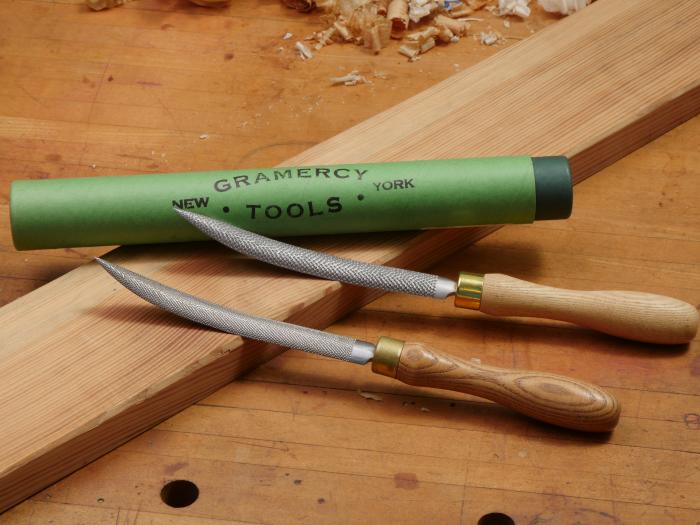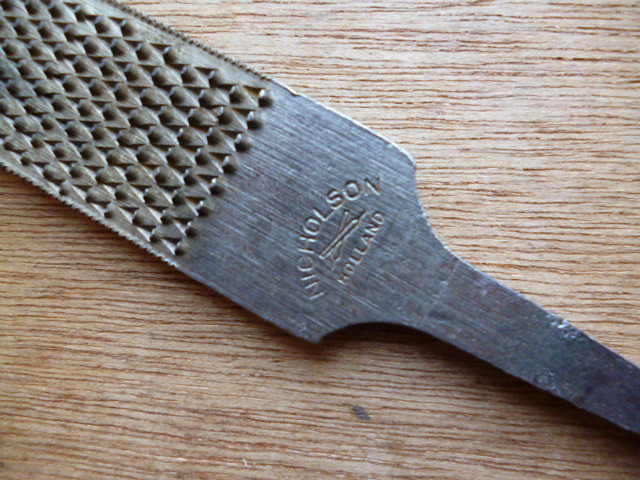I recently purchased a cabinet maker’s rasp from Gramercy Tools. Here is the description of the rasp:
“These Gramercy Tools rasps are hand cut and you will be surprised not only by how fast they work, but by how smooth a surface they leave. Made of surgical grade stainless steel for a tough, long life with a brass ferruled wood handle. The lengths given are the approximate working length of the rasp. “Teeth coarseness” is the approximate number of teeth per inch of the rasp teeth. We have several sizes of rasps designed to cover a wide range of work. The shortest of the rasps is only 5″ long (working length) and is inspired by the long-gone Nicholson 55 – except ours is hand cut. The teeth go out to the edge, for a greater range of work. We have longer rasps with both coarser and finer teeth. The larger, finer rasps are ideal for making cabriole legs and other areas of sculpted furniture-making. The rasps are made in Pakistan, which has a long tradition of metalwork, by a single craftsman with very limited production who is working to our specifications. Sizes will come in an out of stock as supply permits. The handles are made in USA.”
The rasps made by Nicholson are good quality and well-made, but they are mass produced, as opposed to a Pakistan craftsman laboring to hand make each rasp sold by Gramercy. The difference is the process of production and leaves the consumer with a slightly different teeth pattern on the rasp. When the customer runs the rasp over the wood, the handmade rasp does not leave grooves or discernable pattern that needs to be sanded out.
So the question we ask then is, “how refined do you need to be in your work?” Your answer will determine which rasp is best for you. For example, if you are making an axe handle for rough work, then the Nicholson rasp is appropriate. But if you want to make a “cabriole legs and other areas of sculpted furniture” then it will save you time and effort in production if you don’t have to go back and remove teeth grooves and marks from the work. What you need to determine is the tolerance for detail in what you want to produce.
How good is good enough?
How much attention to detail does the work need to be seen as excellent or superior while at the same time not too much so that resources and money are foolishly wasted?
Many times, when the person goes the extra step or spends the extra time he/she is considered a better craftsman. Sometimes, too much time is spent on details that causes you to lose money and time; it ends up being wasteful. There is even a name for people who over emphasize details unnecessarily, obsessive compulsive. For example, washing one’s hands once is good enough, but these individuals may wash their hands four, five or many times more to get them “clean.”
The other side of this is laziness; this is doing less than is typically expected or desired. No one wants to be considered obsessive to the point of foolishness nor does one want to be considered lazy in their work. Some wood workers would say that a Gramercy rasp is unnecessary and expensive when you could just as easily have a Nicholson rasp for much less. They both do the same thing (take wood off of a surface). So, is the end result really worth it? Grooves to sand out, or no grooves to save time.
I guess for me a good craftsman can produce an excellent product or service, in an efficient and timely manner, with little waste (time or materials), so that he/she can charge a fee that is reasonable for their time, materials, and market price while supporting his family.
Wisdom for the Craftsman
Wisdom helps us make this decision. Wisdom is “the ability to judge correctly and to follow the best course of action, based on knowledge and understanding”[1] Most of the historical cultures valued and wrote about wisdom (Egyptians, Sumerians, Greeks, Romans, etc.). But, “the biblical concept of wisdom is quite different from the classical view of wisdom, which sought through philosophy and human rational thought to determine the mysteries of existence and the universe. The first principle of biblical wisdom is that people should humble themselves before God in reverence and worship, obedient to His commands.”[2] Even the wisest man of all time, Solomon, at the end of his life, turned from God and began to make foolish (unwise) decisions.
So, I submit to you the following questions to ask before buying any tool for your trade:
- Have you prayed and talked with God about the purchase of a particular tool? (Specifically, discussing the cost of the tool, and how it will affect your family) Will it please the Lord for you to buy a tool or piece of equipment if it means placing your family in an economic hardship? Or is it an investment to make things better for your family?
- Does the purchase of this tool keep you from doing others things financially that should come first? You could use a credit card to purchase this tool, but that does not help you get out of debt. Can you honestly afford the tool?
- Are you being prideful in the purchase of this tool (either self-congratulatory, or self-righteous in how you saved money, or displaying your “gentlemen’s tools” so others can see them as opposed to actually using them in your craft)?
- It’s ok to have something nice. There is the saying, “Buy once, cry once” which means to buy the best quality as you can financially, and it will last you longer and provide better results (and may be cheaper in the long run because you don’t have to keep replacing the tool).
Whatever decision you make (Nicholson or Gramercy) good luck with your craft, and I hope you the best. Craftsmanship is a lifelong endeavor with many lessons to learn. Just don’t ever stop making stuff.
___________________
[1] Ronald F. Youngblood, General Editor, Nelson’s New Illustrated Bible Dictionary (Nashville, Tennessee; Nelson Publishing, 1995) 1316.
[2] Ibid.

